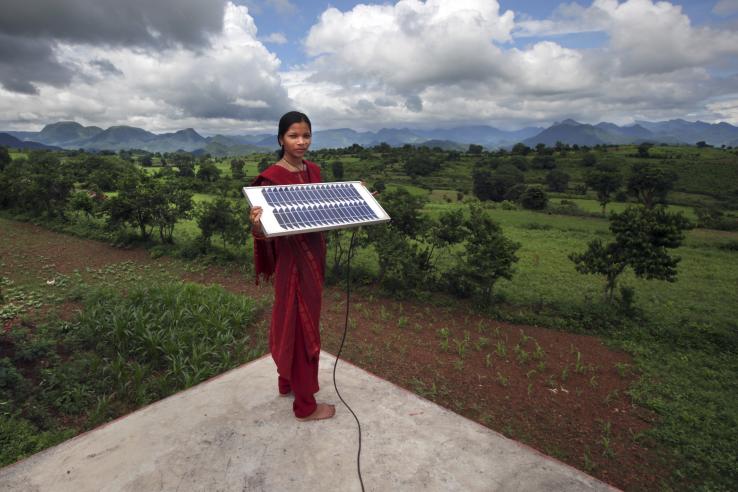New King Climate Action Initiative will design, test, and scale solutions to combat climate change and poverty

Today, in partnership with King Philanthropies, we announced the launch of the five-year $25 million King Climate Action Initiative (K-CAI) at J-PAL. The initiative will support innovative research and policy engagement to combat climate change and poverty around the world.
While climate change affects everyone, its impacts are highly inequitable. It disproportionately harms people living in poverty, people of color, and people in low- and middle-income countries, who are more exposed to its negative impacts and often have fewer resources for adaptation.
Climate change also threatens to reverse decades of progress in global poverty alleviation, continuing the disturbing trend of the COVID pandemic, with the World Bank estimating that climate change could push an additional 130 million people into poverty by 2030.
J-PAL’s mission is to reduce poverty by ensuring that policy is informed by scientific evidence. The climate crisis threatens global progress on poverty, and is deeply in need of its own evidence revolution.
While we have essential, substantial, and growing scientific evidence about how humans are changing Earth's climate and how climate change will affect our planet and societies, another important kind of evidence is lacking. In most cases, policymakers don’t have evidence on the impacts of potential climate solutions in the real world, often having to rely on projections of costs and benefits from desk- or lab-based studies.
K-CAI is among the first major climate change initiatives dedicated to 1) generating evidence on the real-world impacts of potential climate solutions using cutting-edge randomized evaluations, 2) working with decision makers to translate evidence on effective solutions into large-scale action, and 3) identifying climate solutions that benefit people in poverty.
Fighting climate change and poverty with evidence on potential solutions
K-CAI will support collaborations between researchers and leaders in government, NGOs, and the private sector to design, pilot, evaluate, and scale evidence-informed climate change solutions that reduce burdens on and increase opportunities for people living in poverty.
Our research and policy agenda will focus on the four pillars of the global climate and energy challenge:
-
Mitigation: Reducing carbon emissions to slow the pace of climate change and its damaging effects;
-
Pollution reduction: Reducing harmful carbon co-pollutants and thereby improving public health, without reducing critical access to energy;
-
Adaptation: Building communities’ abilities to adapt to the economic, social, and environmental impacts of climate change, particularly in settings threatened by rising sea levels, changing rainfall, extreme weather, and shifting disease vectors, among others factors; and
-
Energy access: Increasing access to affordable and reliable energy for low-income families and communities around the world, and shifting energy systems to cleaner sources.
Over the next 10 years, K-CAI aspires to improve the lives of at least 25 million people living in poverty, reduce carbon emissions and carbon co-pollutants equivalent to $125 million or more, and raise significant additional resources to build a movement for evidence-informed policy at the nexus of climate change and poverty.
Building a movement
K-CAI will accelerate and transform J-PAL’s work in climate change across our research network, all seven of our regional offices, and across our ten sector teams—work that has been ongoing since 2010.
To date, J-PAL affiliated researchers have already evaluated more than forty innovative environment, energy, and climate programs in collaboration with policy partners in over a dozen countries, including off-grid solar, emissions trading schemes, better enforcement of existing regulation, residential and industrial energy efficiency programs, stress tolerant crops, social protection for climate change adaptation, and programs to reduce deforestation and agricultural burning. Effective innovations have been scaled by government partners in Chile and India, among others.
Through K-CAI, our vision is to vastly expand this work to help build a movement of researchers and policymakers working toward evidence-informed policy to mitigate climate change and reduce poverty, similar to the movement that the J-PAL network and our many partners have helped build in global development.
Testing and scaling effective solutions
K-CAI will take a two-track approach to inform climate policy, working together with leaders in government, NGOs, and the private sector, and with climate and social scientists around the world:
1) Design, pilot, and evaluate innovations: In addition to testing promising policies and technologies in the real world using randomized evaluations, K-CAI will bring together leading researchers and implementers to test strategies to change behavior, address market failures, and improve the effectiveness of policy and regulation in the transition to low-carbon economies, recognizing that policy innovation is as critical as technological innovation in solving the climate crisis.
2) Scale effective solutions: K-CAI will catalyze the scaling of interventions that already have evidence of effectiveness by funding technical assistance to decision makers in government, NGOs, and the private sector. Under the initiative, we will build a cadre of fellows seconded to policy partners to implement evidence-informed climate and poverty solutions.
Recognizing the need to dramatically reduce carbon emissions in the next decade to avoid the worst climate scenarios, K-CAI will work to speed up the path from research to policy. The initiative will prioritize funding evaluations that work to generate results more quickly, including by making use of satellite, sensor, and administrative data, and evaluations conducted in partnership with policymakers to scale effective solutions.
K-CAI is chaired by J-PAL affiliated researchers Michael Greenstone (University of Chicago) and Kelsey Jack (University of California, Santa Barbara), who will shape the initiative’s research and policy agenda and provide academic leadership. Claire Walsh will serve as K-CAI’s first Project Director.
K-CAI will issue its first call for proposals to J-PAL affiliated and invited researchers in early August 2020 and will announce the first funded research and scaling projects before the end of the year.
We know we cannot achieve our ambitious goals alone. To learn more about partnership opportunities, please contact us at [email protected].
To stay informed about K-CAI’s work, sign up for the J-PAL newsletter and visit our new initiative page.





